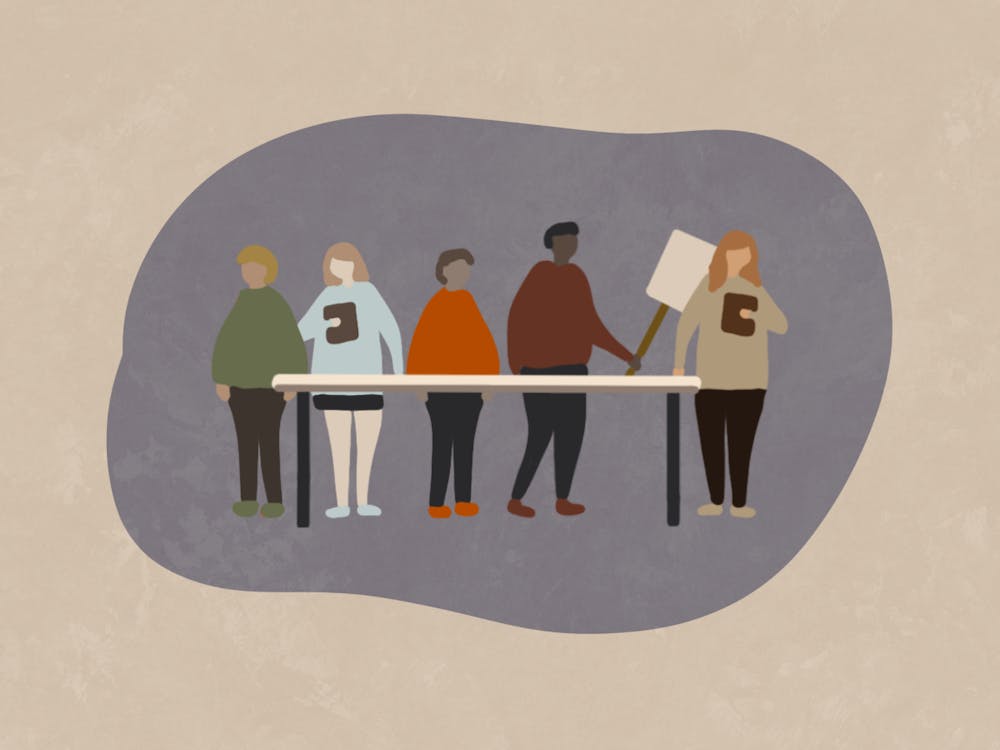Justin Fernandez sat alone on the second floor of the Reitz Union after his freshman orientation in 2022.
He overheard other first-year students sharing plans for their first Fall semester at UF. Feeling intimidated and isolated, Fernandez said he wondered how he'd find his place at UF.
That changed when a preview staffer locked eyes with him.
“Do I know you?” Fernandez asked her.
He didn’t.
“I’ll get to know you,” the preview staffer said.
The preview staffer helped Fernandez connect with the Office of Asian Pacific Islander Desi Engagement at the Center for Inclusion and Multicultural Engagement at the Reitz Union.
The space was a safe haven, he said. Without it, he wouldn’t be the campus leader he is today: president of Sparks Magazine, culture chair for the Filipino Student Association and former programming head for the 2024 Asian American Student Assembly.
His story, like that of many of the minority students at UF, began at the Center for Inclusivity and Multicultural Engagement, a department dedicated to fostering an inclusive environment within the UF student body. It housed the Office of Hispanic Latinx Student Engagement, the Office of Black Student Engagement, the Office of Asian Pacific Islander Desi Student Engagement and the Office of LGBTQ+ Student Engagement.
But when students returned this Fall, they found the space abruptly shut down. Within it, other cultural organizations were eliminated, too. The future of the CIME had been in jeopardy since March when UF eliminated all state-funded DEI programs to comply with Senate Bill 266, which prohibits public colleges and universities from using state or federal funds for DEI programs.
CIME provided three key resources, Fernandez said: support for cultural and identity student organizations, early arrival programs (which supported the transition of incoming students from underrepresented backgrounds) and physical spaces for students to spend their time. The area also served as a hub for events, meetings and community building.
The organizations weren't warned about CIME’s closure, Fernandez, a 20-year-old psychology sophomore, said. He found out his safe haven had closed when he came back to UF this Fall.
"I'm worried for the future of student organizations, especially for first years," Fernandez said. "Who's going to take the mantle of president, vice president, treasurer? How are we going to foster interest if we have a limited range of people to choose from?"
Without the early arrival programs and CIME's support, organizations are competing for the same pool of students, he said.
"Defunding hits organizations in many ways," he said. "It's not just indirectly affecting our groups but also the systems that help propel them."
Although student organizations are funded by UF Student Government, the resources offered within the CIME offices support them.
A secondary concern is that without the CIME and the decreasing number of new members for these organizations, there will be fewer students participating in them, said Fernandez.
"With fewer freshmen and fewer people available, I worry that unity will bend and snap as time goes on," he said. "It will pressure us to compete for members, and I don't want to see that happen.”
Peruvian American Student Society President Adriano Sinfón, a 21-year-old advertising senior, participated in Adelante, one of the early-arrival programs, as a freshman. He later served as a peer mentor and coordinator. For the 2024 cohort, he was set to coordinate again, but all identity-based multicultural programs halted early summer.
"We were left in the dark for months," Sinfón said.
By summer's end, the Hispanic Student Association adopted Adelante and organized its own program.
Despite the challenges, student leaders are working to preserve their communities.
"Losing these resources has opened our eyes to realize we need our community more than ever," Sinfón said.
The loss of CIME has left a void in UF's cultural landscape. As students navigate this new reality, they hold onto the connections they've built.
"I just had to find another space to call home," Sinfón said. "But there are countless students that don't have that luxury."
Without programs like Adelante or APIDSE’s own early-arrival program, FiND, incoming freshmen miss crucial opportunities to connect with their cultural communities, said Ahmad Alarachi, a 20-year-old political science junior and co-advocacy chair of the Asian American Student Union.
"I wouldn't have gone on this path of meeting people and finding a community to help me adjust during my freshman year if it weren't for FiND," Alarachi said.
Some organizations are seeking alternative spaces, but the road ahead is uncertain.
"It's going to take everybody, all hands on deck, to help our communities and continue the work past generations did," Alarachi said.
The spaces that previously inhabited the Reitz second floor were symbols of community and culture, said Luci Urdaneta, a 20-year-old anthropology junior, vice president of programming for the Hispanic Student Association.
"What's more disheartening is that, to this day, UF has not released a statement on CIME being closed," Urdaneta said. "It seems like it didn't matter to UF. And it makes me feel like, as a Latino student here, I don't matter."
UF has not released a statement on the closure of the CIME or its subdivisions.
For many, the fight is about ensuring future students feel seen and supported.
"Having all that representation and even our history, which can't be found online, having all that physical media torn away makes it really hard to make people feel like they belong here," Urdaneta said.
Students involved in these identity-based organizations have expressed concern about further cuts that could impact future generations.
"A lot of us are fearful that the closing of CIME and APIDSE is just the first step," Kori Verge, a 19-year-old political science sophomore and the Filipino Student Association Vice President of External Affairs, said. "Not being able to confidently say that these organizations or spaces will exist for years to come really does suck."
Although the physical spaces were meaningful, what made them unique was the people in them, said Verge.
"At the end of the day, it's the people who make up the space, not the actual room," he said. "I hope we can work towards bringing back these spaces."
For Fernandez, after that day in the Reitz Union, the impact of these closures extends beyond his experiences at Preview and the current community. As they continue to advocate for change, he remains hopeful that unity will prevail.
“When I think of these incoming first years, how are they even going to know that these organizations exist? The space was taken from them." Fernandez said.
Contact Vera Lucia Pappaterra at vpappaterra@alligator.org. Follow her on X @veralupap.

Vera Lucia Pappaterra is The Alligator's Fall 2025 Caiman editor and a junior journalism and history student. She previously served as the enterprise race and equity reporter and the university general assignment reporter. In her free time, she enjoys being a menace on wheels (bike wheels).






